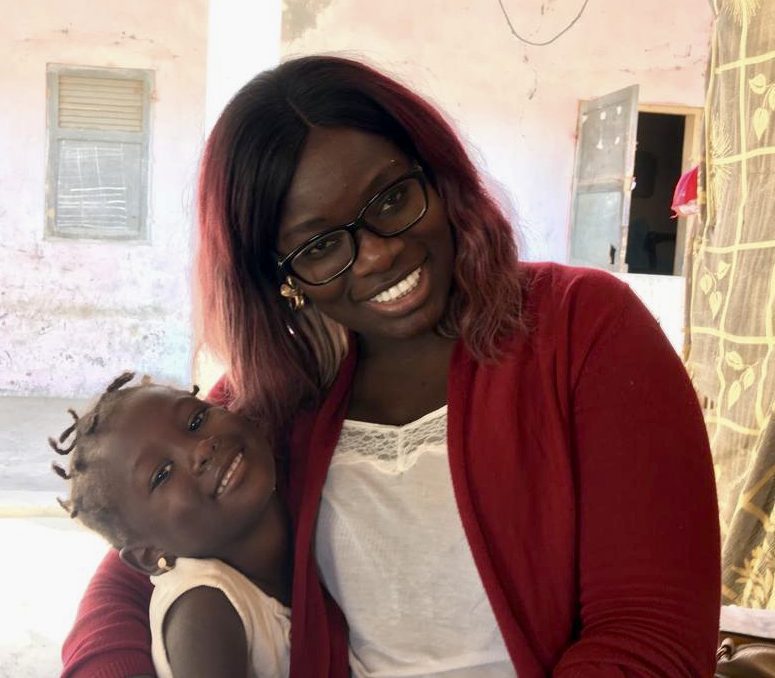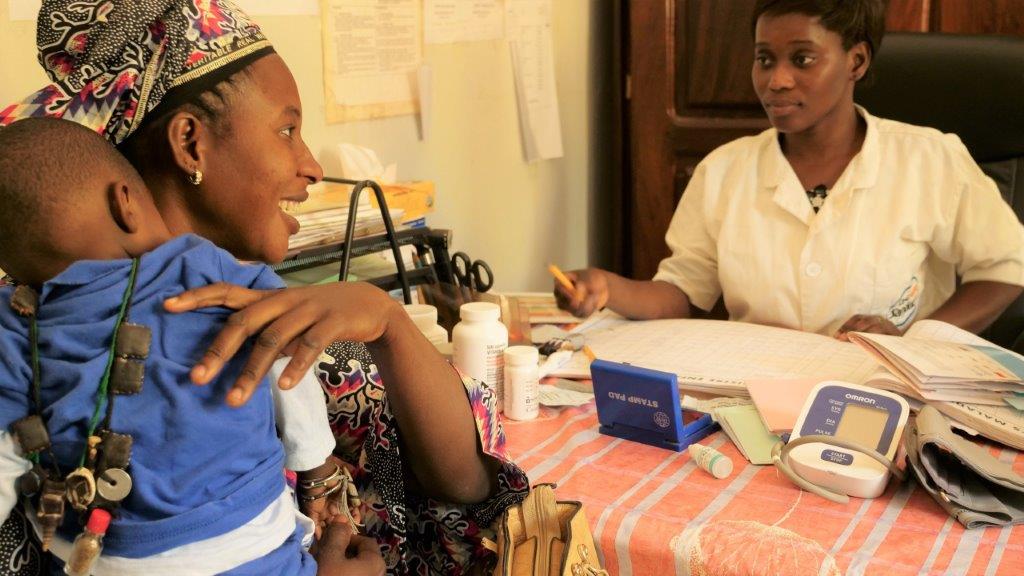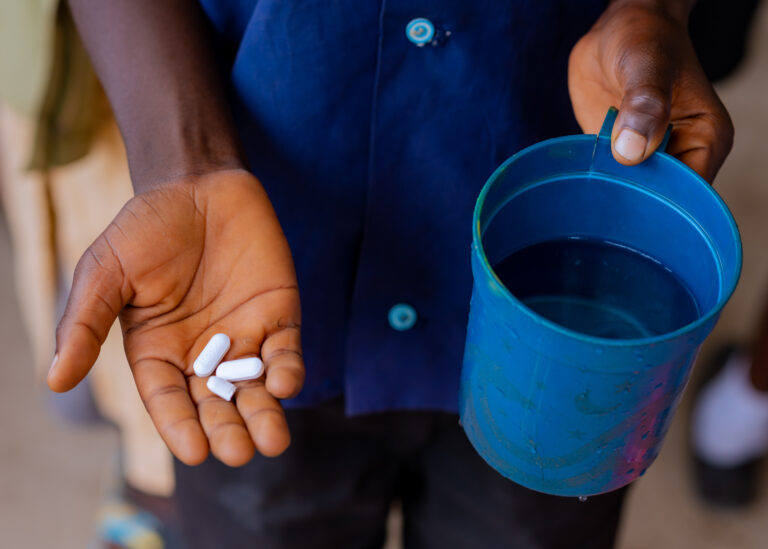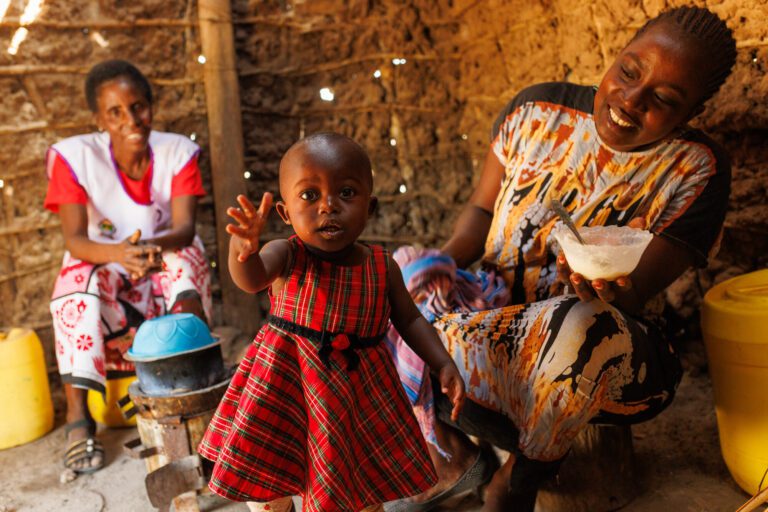Looking Bravely: Keeping families in Senegal healthy during COVID-19

We recently spoke with Maguette Beye, who has helped coordinate Helen Keller Intl’s health and nutrition activities in Senegal since 2014, and Brigitte Malou, a nurse in one of the health clinics that Maguette supports. The women have in common a deep love for children and an abiding commitment to serving their communities and keeping families healthy. Here, they share how the coronavirus outbreak has changed the ways they help even the most remote Senegalese communities access health care and good nutrition.
Q: Maguette, how are you faring amid the crisis?
A: What I feel is, I think, shared by everyone. This is not a situation of one group or another – it’s a human situation. Everyone in the world is going through it. We need solidarity with all humanity right now, but especially with those who are most vulnerable.
It’s hard not knowing what’s going to happen. But we’re starting to find ways to live with the situation, to adapt – and then to adapt again as things change.
Q: What are some of the major impacts you’ve seen?
A: The government took protective measures in the early months of the crisis – the closing of weekly markets and restrictions on travel and gatherings, for example. This, plus a drop in cash transfers from Senegalese people working abroad, has severely impacted the country’s economy.
The Center for Global Development conducted a phone survey in April on the effects of COVID-19 in Senegal. It showed that 87 percent of households had lost income. About a third of people reported having less food to eat. These conditions could lead to severe food insecurity in areas of the country that were already experiencing food insecurity.
During the early months, hospitals and health centers stayed open, but resources were directed to COVID-19 preparedness and response and away from routine healthcare. Plus, people were visiting health facilities like Nurse Malou’s less frequently because they feared catching the virus. Parents were too afraid to bring their children for vaccinations and screenings for malnutrition. So, we risked seeing a rise in communicable diseases as well as an increase in malnutrition, including acute cases.

Q: Brigitte, what are some of the measures that you have taken since the pandemic started, to keep the clinic safe and families healthy?
A: We have taken extensive measures to protect patients as well as healthcare workers. We have put handwashing stations in place at the entrance to the clinic, so that all visitors can wash their hands with clean water and soap. We also do a temperature check on all children at the entrance. Any child who has a fever is isolated with their caretaker in a separate room. There, we use a questionnaire that identifies possible symptoms of COVID-19, and we treat them accordingly.
Mask-wearing is obligatory for everyone inside the clinic, except for children under two years of age. In the waiting room, we put a system in place for physically distancing patients by at least one meter. We also added foot-operated trashcans to help ensure good sanitation.
After every clinical exam, we clean the exam table. In addition to washing their hands, staff use alcohol-based hand sanitizer very often. This is how we are keeping families healthy.
Q: How have you dispelled people’s fears and encouraged them to visit the clinic when they need to?
At the beginning of the pandemic, mothers were reluctant to come to the clinic out of fear of contracting COVID-19. Via radio broadcasts and ads in local languages, we have been educating communities about prevention measures that they can take. These include mask-wearing, handwashing, and social distancing.
During special information sessions, we also drive home the importance of continuing to come to the clinic for both preventative and curative care. This includes immunizations, vitamin A supplementation, deworming treatment, follow-up visits for malnourished children, and regular check-ups. We continue to provide these services while strictly adhering to COVID-19 prevention measures. We encourage the community to come to the clinic so that they can keep their families healthy. Routine healthcare, we remind them, helps guard against all sorts of illnesses.
Q: Maguette, which communities in Senegal are the most vulnerable to COVID-19 and the pandemic’s impact?
A: Rural areas are the most seriously affected, but some urban areas, including the suburbs, are as well. The most vulnerable individuals are pregnant women, lactating women, and children under five years of age. This is the population that Nurse Malou focuses on, so her work is more important now than ever.
Q: In addition to the handwashing stations that Helen Keller has distributed in rural villages, what assistance have you provided in communities like Nurse Malou’s?
A: We worked with the Minister of Health and Social Action to create a plan for adaptation of health services to the context of the pandemic, so that those services can continue to be provided in a safe way. For example, we have trained health care providers on how to maintain screening and management of malnutrition, diarrhea, and malaria in the context of COVID-19. We also taught them how to raise awareness in their communities about COVID-19 prevention measures and safe breastfeeding and hygiene practices.
One of the districts we work in was identified as being among a handful in the country threatened by critical food shortages. In response, our team moved quickly to strengthen an existing program that provides a nutritious blend of grains and legumes (including peanut butter) to moderately malnourished children and pregnant women.
Q: What gives you hope in this challenging time?
A: Our desire to help is what gives me hope. Helen Keller Intl has an important role to play in keeping families healthy, and the people need us. In Senegal, the virus itself is only one element of the threat. The consequences of managing the health crisis are even more severe: lost income, reduced mobility, rising malnutrition. But I’m hopeful because I’m seeing ways that we can make a difference. This challenge is like no other, but I’m confident that we will overcome it.
In 2019, we visited Nurse Malou at her clinic, to see how she helps keep children – and their mothers – healthy and happy. Take a look.



